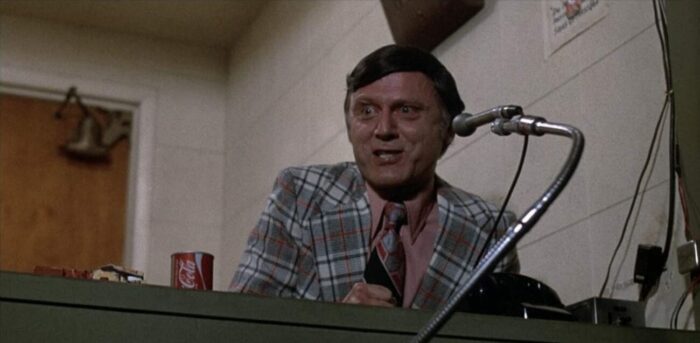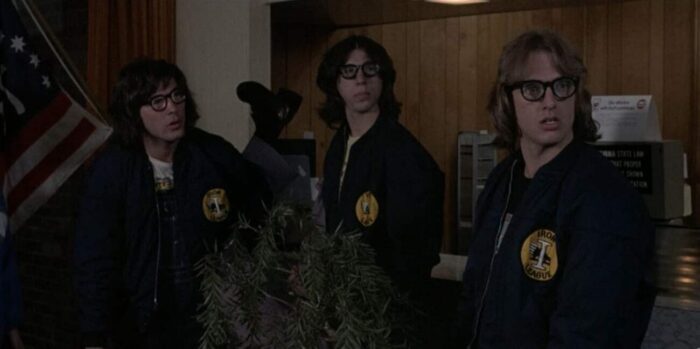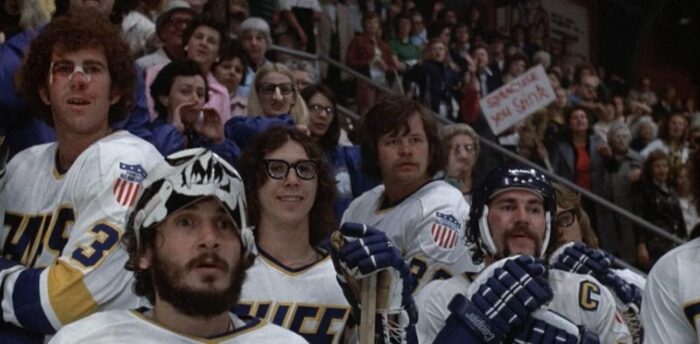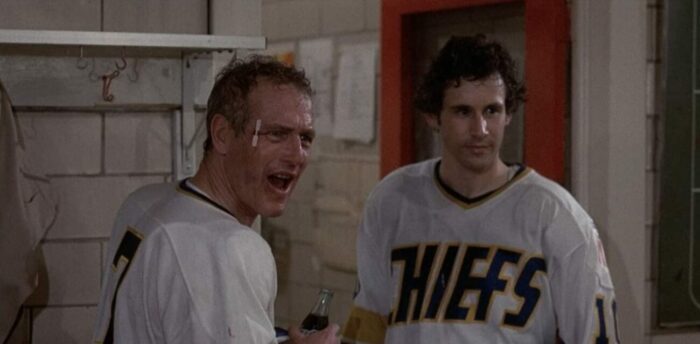Early on in 1977’s Slap Shot, two hockey players appear as in-studio guests on a sports radio show. The host takes a female caller with a question only to have her scornful heckling fill the air instead. The frazzled host loses his ambivalent sleaze, cuts her off, and highlights an embarrassed request. He asks into the microphone, “While we wait for our next caller, we’d like to remind you folks calling in to keep your questions within the boundaries of good taste.”
That “Ha!” you utter out loud or in your head after that destined-to-be ignored line from Andrew Duncan playing Jim Carr might as well say “Fat chance of that,” especially for a movie like this one. Slap Shot is two hours where the so-called “boundaries of good taste” are shoved aside as if a sumo wrestler was delivering a body check to the boards instead of a lithe defenseman on skates. The result is a rough-housing comedy where any resulting penalty minutes for poor conduct are unabashed and even heralded.

Film legend Paul Newman dominates this hockey movie as Reggie Dunlap, the well-past-middle-aged player and coach of the fictional Charlestown Chiefs, a team introduced with local jeers alongside the national anthem at their own home games. Flanked by talented leading scorer Ned Braden (future Twin Peaks notable Michael Ontkean) and a throng of surly regulars (included Allan F. Nicholls and Brad Sullivan), the team is the epitome of the “lovable losers” label. Their cheap manager Joe McGrath (Strother Martin) rubs pennies together to cut corners, remove amenities, and makes the fellas jump through hoops like fashion shows and radio spots like the one listed above to drum up buzz and attendance.
That slim community support teeters on the verge of collapse with the announcement of the local steel mill folding which will gut the town of money, jobs, and recreational ventures like the Chiefs. Facing the team’s final season with a morale boost in mind, Dunlap concocts a media-spun scheme that the silent owner of Chiefs is shopping them to a Florida buyer. This faint and false hope, coupled with the arrival of a trio of brutishly dim (and future cult hero) Hanson brothers, sparks a winning streak and a spike in popularity fueled by brawling spectacles akin to the cartoonish antics of professional wrestling.

As a sports movie, the humorous pre-credits discussion in Slap Shot between Jim Carr and goaltender Denis Lemieux (Yvon Barrette) about the “finer points of hockey” is as deep into the Xs and Os as an eager viewer is going to get about this burly ballet. Written by Nancy Dowd, who would win the original screenplay Oscar the next year for Coming Home, the narrative was born from her brother Ned Dowd’s minor league hockey experience with the Johnstown Jets. Coincidentally, Ned, a future big-time producer for Caravan Pictures, was hired as the film’s technical advisor and stunt coordinator. It was pitched as a documentary subject before director George Roy Hill (The Sting, Butch Cassidy and the Sundance Kid) turned into a feature comedy.
It was the right move. What you get are meatball players for a meatball audience. Goons are made into heroes in the sport today that has greatly tamed its bloodthirsty old habits. The hockey in Slap Shot was merely the slick stage and sterling uniform for the character comedy that scuffs and bloodies a blue-collar reality far away from any flashy NHL pinnacle. That said, the gliding and kinetic camerawork from Victor J. Kemper (National Lampoon’s Vacation, Clue) makes the low-rent bush-league action look like a million bucks when necessary. The movie is scoreless with zero pomp as well, where surging orchestrations are replaced by semi-diegetic pop hits of the day played on repeat, like Maxine Nightingale’s inescapable “Right Back Where We Started From.”

Slap Shot is as much about the external desperation of a small town staving off extinction as it is about wins and losses on the ice. This is the pioneer sports movie where you have a hapless team of misfits over-performing with sideshow popularity to miraculously surge in the standings towards a championship while the real meat and joy comes from their shared time together on the road as chummy teammates. Major League and Bull Durham each owe this movie a steak dinner and a case of beer. Make it Stroh’s and “none of that stinkin’ root beer” and it will be welcomed with open arms.
The movie’s legacy after being a modest box office hit has only grown. Nightingale’s party ditty became the victory song for two NHL clubs. 21 years later in 1998, Slap Shot topped a Maxim magazine list as the “Best Guy Movie of All-Time.” In the words of a fake Nicolas Cage played by Andy Samberg, “that’s high praise.” In 2003, Entertainment Weekly slotted it as its #31 cult film, ahead of The Big Lebowski, Showgirls, and more. That doesn’t even take into account the hundreds of high-profile placements on “best sports film” lists from writers and publications across the spectrum. There’s not enough ice in Greenland to cover all that praise and print.
While Paul Newman felt like he never aged for much of his career, there’s a chance the comfortable cult classic status Slap Shot has enjoyed may dwindle. Likely reevaluation in today’s equitable social climate would not go well with its flippant vulgar vocabulary, permeating homophobia, and rampant displays of toxic masculinity. We can frown on it or slap a warning label on it, but the shamelessness does not disappear amidst 176 F-bombs. Like many other dated comedies of the 1970s, one must call it the time capsule it is for its era, complete with the gaudy fashions overseen by Tom Bronson (First Blood, Beverly Hills Cop) and dingy locations dressed by two-time Oscar-winning art director Henry Bumstead (The Sting, To Kill a Mockingbird).
Truth be told, a discerning eye and a willing heart can and will see through its chauvinism. Written by a woman, the real punches in this slobberknocker buffet hit the very deserving male targets right between the legs of their pride and the eyes of their gazes. The members of the fairer sex are often the smartest people in every arena and room. Several embody more than arm candy or post-game conquests.
A trio of different beleaguered wives stands out. Swoosie Kurtz’s Shirley Upton is the simplest one as the loyal bleacher bum who has her stand-by-her man zingers. Reggie’s ex-wife Francine (Jennifer Warren) plays a more active role, since she has seen been there too much for this cycle of failure. Behind-the-scenes, she is spreading her wings to quit clinging to her beau and do something for herself outside of Charlestown. Lastly and chief (no pun intended) among them, Lily Braden, played by Newman’s future The Verdict co-star Lindsay Crouse, represents the constant voice of miserable dissent to her husband Ned, where none of what transpires in this lifestyle entertains or tempts her inany wayy. She roots for failure in a movie catapulting itself constantly to avoid it. In doing so, she never comes off as the killjoy she is treated as by Reggie and Ned, which is a compliment to Nancy Dowd’s character creation depth.

No matter the woman dangled before them, the athletic and dentally-challenged Neanderthals with sticks bend for their constant approval. It’s their macho failures among each other that get the most laughs. The leading alpha wolf of that gainful pursuit is always Paul Newman. The future Oscar winner was 52 at the time of Slap Shot and was clearly having a ball. His winks and smiles to play every angle in and out of the rink show his endless guile and sex appeal as a performer and screen presence. In the decades since, Newman frequently called Reggie Dunlap his favorite role of his storied career and Slap Shot the most fun he had making a movie. It’s mighty easy to see why.



